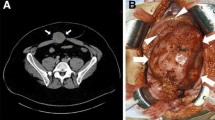Opinion statement
Desmoid tumors (aggressive fibromatosis) are rare neoplastic tumors that may occur sporadically or in association with familial adenomatous polyposis (FAP). The etiology of these tumors is unknown, but hormonal, genetic, and physical factors play a role in their development and growth. A distinction is often made between desmoids in patients with FAP and those in patients without FAP, but clinically these tumors are treated the same; the only difference is the preferential intra-abdominal location of FAP desmoids. The goal of desmoid treatment is local control. Choosing the appropriate method for achieving local control may be complex as the functional and cosmetic outcomes of each method must be considered. In addition, because desmoids spontaneously regress, any claim of successful intervention must be viewed skeptically. Local control is mainly achieved by surgical intervention and may be improved with the addition of radiation therapy (RT). For patients who cannot undergo surgery, the options for local control include RT and systemic therapies such as hormones, nonsteroidal anti-inflammatory drugs (NSAIDs), interferon, and chemotherapy. Patients with symptomatic, progressive disease who can tolerate chemotherapy should be presented with the option of low-dose or standard antisarcoma chemotherapy. Although it is unclear which regimen is better, patients appear to have quicker responses to the standard antisarcoma therapy. Hormone therapy, NSAIDs, and interferon are used often, with varying success, and should be reserved for minimally symptomatic patients or for patients who do not want or are not candidates for chemotherapy. The treatment of desmoid tumors remains an enigma. As more options become available, selecting the correct therapy becomes more nuanced. Further clinical trials are needed to help the clinician navigate his or her way through the morass of desmoid tumor therapies.
Similar content being viewed by others
References and Recommended Reading
Zlotecki RA, Scarborough MT, Morris CG, et al.:External beam radiotherapy for primary and adjuvant management of aggressive fibromatosis. Int J Radiat Oncol Biol Phys 2002, 54:177–181. Good report on the role of radiation alone in desmoid tumors.
Bertario L, Russo A, Sala P, et al.:Genotype and phenotype factors as determinants of desmoid tumors in patients with familial adenomatous polyposis. Int J Cancer 2001, 95:102–107.
Goldblum J, Fletcher JA:Desmoid-type fibromatoses. In World Health Organization Classification of Tumors. Edited by Fletcher CD, Unni KK, Mertens F. Lyon, France:International Agency for Research on Cancer (IARC); 2002:83–84.
Cheon SS, Cheah AY, Turley S, et al.:beta-Catenin stabilization dysregulates mesenchymal cell proliferation, motility, and invasiveness and causes aggressive fibromatosis and hyperplastic cutaneous wounds. Proc Natl Acad Sci U S A 2002, 99:6973–6978.
Tejpar S, Michils G, Denys H, et al.:Analysis of Wnt/beta catenin signalling in desmoid tumors. Acta Gastroenterol Belg 2005, 68:5–9.
Tejpar S, Li C, Yu C, et al.:Tcf-3 expression and betacatenin mediated transcriptional activation in aggressive fibromatosis (desmoid tumour). Br J Cancer 2001, 85:98–101.
Mendenhall WM, Zlotecki RA, Morris CG, et al.:Aggressive fibromatosis. Am J Clin Oncol 2005, 28:211–215.
Leithner A, Gapp M, Radl R, et al.:Immunohistochemical analysis of desmoid tumours. J Clin Pathol 2005, 58:1152–1156.
Nuyttens JJ, Rust PF, Thomas CR Jr, Turrisi AT 3rd:Surgery versus radiation therapy for patients with aggressive fibromatosis or desmoid tumors:a comparative review of 22 articles. Cancer 2000, 88:1517–1523. Excellent summary on the role of surgery with or without RT.
Waddell WR, Gerner RE:Indomethacin and ascorbate inhibit desmoid tumors. J Surg Oncol 1980, 15:85–90.
Hansmann A, Adolph C, Vogel T, et al.:High-dose tamoxifen and sulindac as first-line treatment for desmoid tumors. Cancer 2004, 100:612–620.
Wilcken N, Tattersall MH:Endocrine therapy for desmoid tumors. Cancer 1991, 68:1384–1388.
Raguse JD, Gath HJ, Oettle H, Bier J:Interferon-induced remission of rapidly growing aggressive fibromatosis in the temporal fossa. Int J Oral Maxillofac Surg 2004, 33:606–609.
Leithner A, Schnack B, Katterschafka T, et al.:Treatment of extra-abdominal desmoid tumors with interferonalpha with or without tretinoin. J Surg Oncol 2000, 73:21–25.
Okuno SH, Edmonson JH:Combination chemotherapy for desmoid tumors. Cancer 2003, 97:1134–1135.
Patel SR, Evans HL, Benjamin RS:Combination chemotherapy in adult desmoid tumors. Cancer 1993, 72:3244–3247.
Weiss AJ, Horowitz S, Lackman RD:Therapy of desmoid tumors and fibromatosis using vinorelbine. Am J Clin Oncol 1999, 22:193–195. Initial report on the value of low-dose chemotherapy in the treatment of desmoid tumors.
Azzarelli A, Gronchi A, Bertulli R, et al.:Low-dose chemotherapy with methotrexate and vinblastine for patients with advanced aggressive fibromatosis. Cancer 2001, 92:1259–1264.
Lynch HT, Fitzgibbons R Jr, Chong S, et al.:Use of doxorubicin and dacarbazine for the management of unresectable intra-abdominal desmoid tumors in Gardner's syndrome. Dis Colon Rectum 1994, 37:260–267.
Gega M, Yanagi H, Yoshikawa R, et al.:Successful chemotherapeutic modality of doxorubicin plus dacarbazine for the treatment of desmoid tumors in association with familial adenomatous polyposis. J Clin Oncol 2006, 24:102–105. Current study on the role of doxorubicin and dacarbazine in desmoid tumors.
Mace J, Sybil Biermann J, Sondak V, et al.:Response of extraabdominal desmoid tumors to therapy with imatinib mesylate. Cancer 2002, 95:2373–2379.
Heinrich MC, McArthur GA, Demetri GD, et al.:Clinical and molecular studies of the effect of imatinib on advanced aggressive fibromatosis (desmoid tumor). J Clin Oncol 2006, 24:1195–1203. Up-to-date study defining the role of imatinib in desmoid tumors and exploring imatinib's mechanism of action.
Author information
Authors and Affiliations
Rights and permissions
About this article
Cite this article
Okuno, S. The enigma of desmoid tumors. Curr. Treat. Options in Oncol. 7, 438–443 (2006). https://doi.org/10.1007/s11864-006-0019-4
Issue Date:
DOI: https://doi.org/10.1007/s11864-006-0019-4




